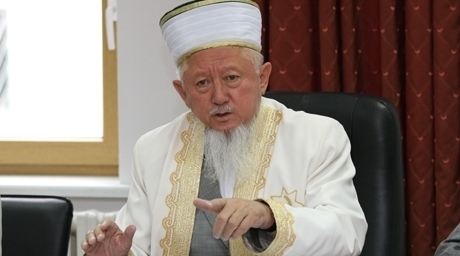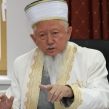Islam in Central Asia

Roundtable Discussion
Islam in Central Asia
Featuring:
The Supreme Mufti of Kazakhstan
Abdsattar Hadji Derbissali
Chairman of the Spiritual Administration of Muslims of Kazakhstan
With Remarks By: Jacob Zenn
Analyst, The Jamestown Foundation
Moderator: Glen Howard
President, The Jamestown Foundation
Tuesday, November 20, 2012
10:00 A.M.–11:30 A.M.
The Jamestown Foundation
7th Floor Conference Room
1111 Sixteenth Street, N.W.
Washington, D.C. 20036
On November 20, the Jamestown Foundation hosted a roundtable discussion with Abdsattar Hadji Derbissali, the Supreme Mufti of Kazakhstan and Chairman of the Spiritual Administration of Muslims of Kazakhstan. Mr. Derbissali discussed the revival of Islam in Central Asia since independence, current influences on the traditional Hanafi School of Islam, Muslim religious organizations, and religious rights in Kazakhstan and the wider region. The Supreme Mufti also presented the book, Islam in Central Asia. Whereas Jamestown analyst Jacob Zenn provided an in-depth look at the growing phenomenon of extremist Islamic movements in Central Asia and Russia’s Middle Volga region. He noted the cross-boundary nature of these organizations and commented on the rising trend of violent extremism in previously peaceful Russian Federation republics of Tatarstan and Bashkortostan, which are located in close proximity to Central Asia and share many of this region’s social and cultural history.
Bios
Abdsattar Hadji Derbissali
Abdsattar Hadji Derbissali was elected as Supreme Mufti and Chairman of the Spiritual Administration of Muslims of Kazakhstan at the third Kurultai of Muslims of Kazakhstan in June 2000. In 2005 and 2010 he was re-elected to this high and influential position. In 2007, he was elected Chairman of the Council of Muftis of Central Asia. Mr. Derbissali has been the generator of fundamental changes in the operation of the Mufti Council in Kazakhstan.
Abdsattar Hadji Derbissali strongly rejects uniting Islam with politics and establishing political parties and various kinds of public movements based on religion. He is noted for his high level of religious culture, has an excellent command of the Arabic language and speaks English.
Jacob Zenn
Jacob Zenn graduated from Georgetown Law in 2011 and the Johns Hopkins School of Advanced International Studies (SAIS) Nanjing Center for Chinese-American Studies in Nanjing, China, in 2007. At Georgetown Law he worked with the United Nations High Commissioner for Refugees (UNHCR) in Kuala Lumpur, Malaysia, and at an international law firm in Bangkok, Thailand, and carried out a fellowship sponsored by the American Society of International Law (ASIL) and Chadbourne & Parke LLP’s Middle-East North Africa Team in Yemen during which time he also went to Hargeisa, Somaliland to observe elections. Mr. Zenn is also an Honorary Member of the Center of Shanghai Cooperation Organization (COSCOS) Studies in Shanghai, China. As an analyst, he writes regularly for the Jamestown Foundation, focusing on Nigeria and Central Asia, and he has contributed international affairs articles for publications such as Asia Times, Hürriyet, Yemen Times and the CTC Sentinel. Jacob has been a charter member of the National Language Service Corps since 2011 for Bahasa Indonesia, Mandarin Chinese and Arabic (MSA). His writing, panel discussions and co-authored works have included issues ranging from “Association and Assembly in the Digital Age” (The International Journal of Not-for-Profit Law, Volume 13, Issue 4, December 2011), “Lessons from Turkish Civil Society for the Arab Spring” (SETA Foundation at Washington D.C.), and the “International Migrants Bill of Rights” (Geo. Immigr. L.J. 395-506).




